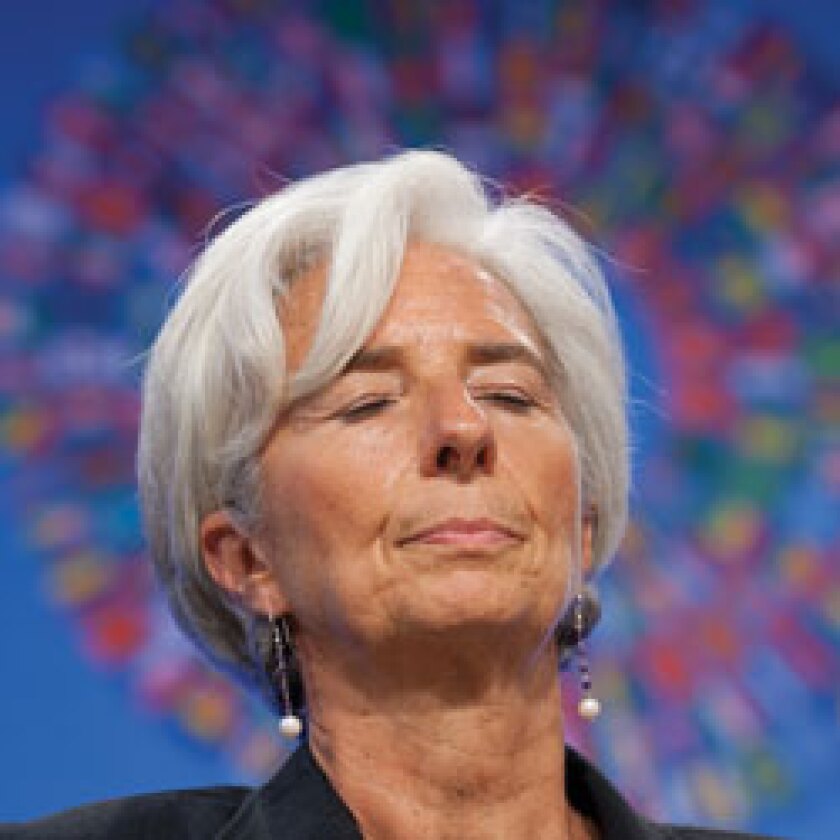Christine Lagarde registered two significant achievements in her first 15 months as managing director of the IMF, a performance that will be hard to match in the year ahead.
The first, in August 2011, was when she sounded the alarm that European banks needed to be recapitalized to meet the challenge of the region’s debt crisis.
Second, she succeeded in mobilizing nearly $500 billion of new resources to ensure that the global lender could respond to future emergencies.
Lagarde, a former French finance minister, assumed office in July 2011 taking over a 64-year-old institution that was still traumatized by the sex scandal that had forced Dominique Strauss-Kahn, its former head, to resign in disgrace. The fund had been further shaken by an unprecedented public contest for the top job that pitted Lagarde against Mexico’s central bank chief Agustín Carstens.
With the 2008 financial crisis still simmering, Lagarde correctly identified her principal task as safeguarding the global financial system. In August 2011, only weeks into the job, she surprised participants at the Jackson Hole, Wyoming monetary symposium by aiming a broadside at her in-denial colleagues in the 16-nation euro currency zone.
Your banks, she boldly declared, require “urgent recapitalization” to withstand the risk of sovereign default. Dismissed by some continental bankers who protested that their capital buffers were adequate, the European Banking Authority endorsed Lagarde’s analysis and ordered a 9% or €115 billion increase in eurozone tier-1 capital.
Lagarde argued that capital reserves were the “key to cutting the chains of [eurozone] contagion”. Action has been taken as even now Spanish banks are being recapitalized with help from European debt agencies.
With the European crisis heading towards a crescendo in late 2011, G20 leaders agreed that the IMF should have special additional resources so it could handle future emergencies. Amid prospects of a Greek default, and with Ireland, Portugal and Greece already in hock to the fund, IMF loan commitments had soared to a record $250 billion, with nearly half earmarked for Europe.
In December EU countries pledged $270 billion to the IMF, and other nations soon followed. In April Lagarde won bilateral pledges totalling $430 billion. At the G20 Los Cabos summit in June, emerging market countries including China, India, Russia, Brazil and South Africa (the Brics countries) boosted the overall commitment to $456 billion.
Amando Tetangco, who heads the Philippines central bank, says the contribution ultimately serves the national interest even though part of the money is likely to be used to prop up troubled members of the eurozone. “When we actually thought about providing resources to the fund, for it to be able to help countries that were affected by the debt crisis, we thought that it was also a way of helping ourselves and the rest of the emerging markets. So if there is an international effort to try to address these problems in Europe, I think it would be good not only for advanced countries but also for emerging markets,” Tetangco tells Emerging Markets.
Charles Dallara, head of the Institute of International Finance (IIF), credits Lagarde with “very important and effective leadership” in mobilizing the bail-out fund that essentially doubles IMF resources. Edwin Truman, formerly a top Treasury and Federal Reserve official involved with US policy on the IMF, agrees, commending Lagarde for an excellent first year. Noteworthy, says Truman, was Lagarde’s early declaration of independence from the EU.
However, some officials warn, despite her drive, she is unlikely to succeed on her own in persuading the eurozone countries to sort out their debt problems, therefore she must ensure that the burden of dealing with the issue is shared as fairly as possible.
“Christine Lagarde is available, is present, and is giving the direction that needs to be given, but she can’t take the decisions for the heads of state and the members of the European Union,” South Africa’s central bank governor Gill Marcus says.
Would it have been better if the IMF had a managing director who wasn’t from Europe, as many in emerging markets wanted last year at the time of the election?
“It doesn’t matter,” says Marcus. “Whoever is at the helm of the IMF, they’ve certainly got a role, and they must be careful about ensuring that there is an even-handed approach in the way you deal with advanced economies and emerging markets. I think the real question here is that the responsibility and the decision-making must be exercised by those who are responsible for Europe at the moment.”
